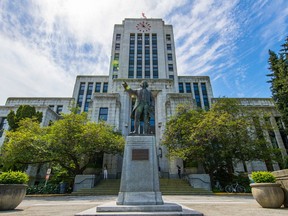[ad_1]
Opinion: Without clear, measurable goals and an objective assessment of expected benefits relative to costs, policies have unintended consequences

Article content
Climate change once again makes headlines due to scorching temperatures in the U.S. and Europe, and large forest fires in Canada. All levels of government, including cities, are spending time and money to develop their own green programs.
Vancouver, for example, developed a five-year Climate Emergency Action Plan with a forecast $500 million spending plan. That is a large amount of money for a city of 662,000 people. Its goal aligns with the federal government’s plan to reduce greenhouse gas emissions to 50 per cent of 2007 levels by 2030. Some of the city’s efforts, such as retrofitting its buildings, replacing its vehicle fleet, and improving the city’s tree canopy are extensions of its regular operations. Other programs, however, that encourage greener behaviour may be more problematic.
Advertisement 2
Article content
Article content
Recent examples of the latter include wanting to impose a citywide parking fee on residential curbside parking and introducing a fee for disposable single-use cups. In 2022, the city council under Mayor Kennedy Stewart voted to implement new licensing regulations for gas stations and parking lots. Starting in 2025, annual licence fees will jump from $243 for gas stations and $163 for parking lots to $10,000 for those lacking the required electric charging stations. The city noted the goal is to provide more charging facilities to encourage electric vehicle adoption, rather than a source of city revenue.
In a report to city council, there were no quantitative estimates on either new EV sales the policy might lead to, or how many residents would reduce gas-powered vehicle usage because of this policy. But the report did forecast that the city would benefit by $1,656,000 annually, assuming that 60 to 70 per cent of the businesses targeted would rather pay the annual $10,000 than install the required rechargers. If the goal is to encourage more charging stations, why did the city proceed with a policy in which it thinks that only 30 per cent of targeted businesses would take part?
Article content
Advertisement 3
Article content
Businesses do not install fast-charging stations because they are not profitable. A report done for the city estimates that a DC fast-charging station, as required for gas stations, costs about $136,000 per installation, and will generate a forecast annual “profit” of $6,000 by 2030. The report also states it will take eight years to recoup the $136,000 installation cost.
Look at how they calculate the eight-year payback period. The $6,000 is made up of the charging fees and income from additional convenience-store sales expected while waiting for the charge to finish. Including extra convenience-store sales makes sense, though it is difficult to say if the amount forecasted is reasonable.
Their calculation also assumes that the $10,000 annual licence fee that is avoided is a cash inflow, since the businesses will save that amount each year if they install the chargers. While this is technically correct, it distorts the payback period’s result. Using this logic, even if a gas station generates zero convenience-store sales and recharging fees, it can still recover its initial $136,000 cost in less than 14 years ($136,000 divided by $10,000 saved annually equals 13.6 years).
Advertisement 4
Article content
In this case, the time it takes a business to recover its investment has no practical value. As the saying goes, you can put lipstick on a pig, but it is still a pig. There is no actual business case for these fast-charging stations.
The city also stated that community engagement efforts found “overall, [the] stakeholders seemed interested in the project . . . .” Since gas stations and parking lots have the most at stake here, I am at a loss to explain the contradiction between the reported statement and the poor business case.
I am not trying to defend the gas station or parking lot owners. I’m sure they are capable of doing so on their own. But I do highlight this policy as being poorly planned, having significant costs but with no quantifiable targets and benefits, except for the fees collected by the city. The businesses will likely pass on the $10,000 annual fee to consumers through higher prices.
In Vancouver’s latest Climate Emergency Action Plan, the city stated it will present to council new fees and charges to “…encourage low carbon investments and behaviours.” New policies must come with clear, measurable goals and an objective assessment of the policy’s expected benefits relative to its costs.
Advertisement 5
Article content
Ill-conceived policies carry consequences, often burdening residents with increasing living costs. But the unintended consequences can be just as important. Whether it is Vancouver’s failed city-wide residential parking tax, single-use cup fee, or a coercive $10,000 licensing fee, we need to do better.
Poor policies undermine voter trust and can make implementing important future policies more difficult. Mayor Ken Sim and the city council should take a stand and rescind the $10,000 licensing bylaw change. That would send a clear message to voters and the city that bad policies will no longer pass under their leadership.
Jerome Gessaroli leads The Sound Economic Policy Project within the School of Business at BCIT. He is also the lead Canadian co-author of the book, Financial Management Theory and Practice, 4th CE.
Article content
[ad_2]
Source link


Comments
Postmedia is committed to maintaining a lively but civil forum for discussion and encourage all readers to share their views on our articles. Comments may take up to an hour for moderation before appearing on the site. We ask you to keep your comments relevant and respectful. We have enabled email notifications—you will now receive an email if you receive a reply to your comment, there is an update to a comment thread you follow or if a user you follow comments. Visit our Community Guidelines for more information and details on how to adjust your email settings.
Join the Conversation